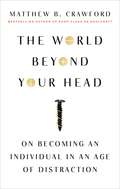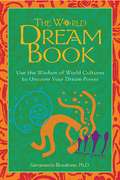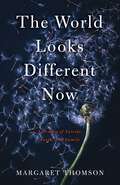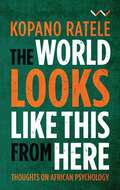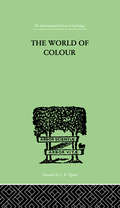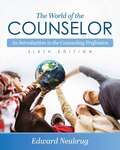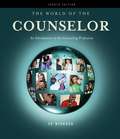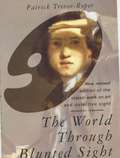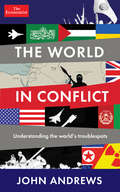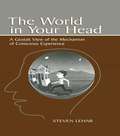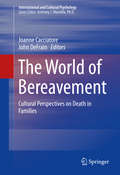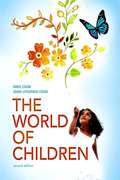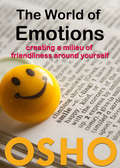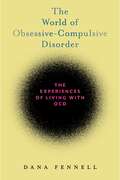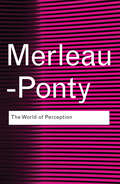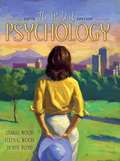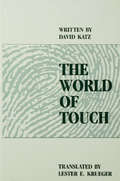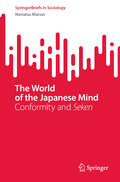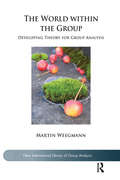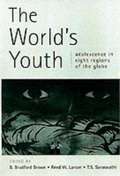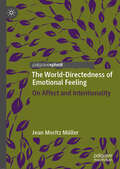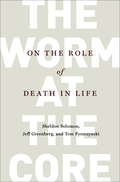- Table View
- List View
The World Beyond Your Head: On Becoming An Individual In An Age Of Distraction
by Matthew B. CrawfordA groundbreaking new book from the bestselling author of Shop Class as Soulcraft In his bestselling book Shop Class as Soulcraft, Matthew B. Crawford explored the ethical and practical importance of manual competence, as expressed through mastery of our physical environment. In his brilliant follow-up, The World Beyond Your Head, Crawford investigates the challenge of mastering one's own mind. We often complain about our fractured mental lives and feel beset by outside forces that destroy our focus and disrupt our peace of mind. Any defense against this, Crawford argues, requires that we reckon with the way attention sculpts the self. Crawford investigates the intense focus of ice hockey players and short-order chefs, the quasi-autistic behavior of gambling addicts, the familiar hassles of daily life, and the deep, slow craft of building pipe organs. He shows that our current crisis of attention is only superficially the result of digital technology, and becomes more comprehensible when understood as the coming to fruition of certain assumptions at the root of Western culture that are profoundly at odds with human nature. The World Beyond Your Head makes sense of an astonishing array of common experience, from the frustrations of airport security to the rise of the hipster. With implications for the way we raise our children, the design of public spaces, and democracy itself, this is a book of urgent relevance to contemporary life.
The World Dream Book: Use the Wisdom of World Cultures to Uncover Your Dream Power
by Sarvananda BluestoneA unique self-help guide to dream interpretation using techniques and icons from cultures around the world. • Challenges the assumption that all symbols universally signify the same thing to all dreamers. • Includes numerous stories, games, and exercises for inducing, recalling, interpreting, and utilizing dreams. • Extends beyond Jung and Freud to include dream theory from numerous world cultures, including the Temiar of Malaya, the African Ibans, the Lepchka of the Himalayas, and the Ute of North America. Dreaming can be used as a tool for understanding our own consciousness, enhancing creativity, receiving visions, conquering fears, interpreting recent events, healing the body, and evolving the soul. Tapping into the vast dreaming experiences and lore of the world's cultures--from the Siwa people of the Libyan desert to the Naskapi Indians of Labrador--Sarvananda Bluestone challenges the assumption that all symbols universally signify the same thing to all dreamers. The World Dream Book encourages readers to develop their own, personalized symbols for understanding their consciousness and provides a series of stories, multicultural techniques, and games to help them do so. Playful explorations, such as the aboriginal "Sipping the Water of the Moon," teach how to induce, recall, interpret, and utilize the power of dreams. Readers will discover how a stone under a pillow can help us remember a dream and will explore their own dormant artist and writer as they reclaim the power of their sleeping consciousness. Sarvananda Bluestone applies his uniquely engaging style to demonstrate that, with a few simple tools, everybody has the capacity to unleash their full dreaming potential.
The World Looks Different Now: A Memoir of Suicide, Faith, and Family
by Margaret ThomsonOn a glorious, if blisteringly hot, Saturday in August 2010, Margaret Thomson&’s world is suddenly shattered by the incomprehensible news that her twenty-two-year-old son, a medic in the army, has taken his life.In a deep state of shock, Thomson and her husband immediately travel to Fort Bragg, North Carolina, where their son Kieran was stationed, in an effort to assist their daughter-in-law. Upon their arrival, though, the couple find themselves plunged into a labyrinthine and, at times, seemingly bizarre world of military rules and regulations.Eventually, after the funeral and the memorial services are over, an even more challenging journey—emotionally as well as geographically—ensues, especially for Margaret, who, as a former journalist, is determined to find out more about the circumstances surrounding her son&’s death, no matter how high the cost.As she enters her second year of grieving, Thomson receives an unexpected invitation from an unlikely source—the army, which she&’s often blamed in many ways, whether fairly or not, for her son&’s death. Seizing upon this opportunity, Thomson finds that her perspective is changed—literally—and that as a result the world does indeed look different now.
The World Looks Like This From Here: Thoughts on African Psychology
by Kopano RateleBuilds a compelling case for thinking and doing psychology differently in and for AfricaWhat does the world look like from Africa? What does it mean to think, feel, express without apology for being African? How does one teach society and children to be African—with full consciousness and pride? In institutions of learning, what would a textbook on African-centred psychology look like? How do researchers and practitioners engage in African social psychology, African-centred child development, African neuropsychology, or any area of psychology that situates African realities at the centre? Questions such as these are what Kopano Ratele grapples with in this lyrical, philosophical and poetic treatise on practising African psychology in a decolonised world view. Employing a style common in philosophy but rarely used in psychology, the book offers thoughts about the ideas, contestation, urgency and desire around a psychological praxis in Africa for Africans. While setting out a framework for researching, teaching and practicing African psychology, the book in part coaxes, in part commands and in part urges students of psychology, lecturers, researchers and therapists to reconsider and reach beyond their received notions of African psychology.
The World Of Colour (International Library Of Psychology Ser. #Vol. 6)
by Katz, DavidFirst Published in 1999. Routledge is an imprint of Taylor & Francis, an informa company.
The World Of The Counselor: An Introduction To The Counseling Profession
by Edward NeukrugThe sixth edition of The World of the Counselor: An Introduction to the Counseling Profession provides readers with an illuminating window into the day-to-day realities of a practicing counselor. Comprehensive and highly practical in nature, the text presents readers with critical skills and concepts, helps them develop their professional identity, and features illustrative case examples and personal narratives to bridge theory and practice.
The World Of The Counselor: An Introduction To The Counseling Profession
by Edward S. NeukrugDescribed by many as a comprehensive, yet fun and easy-to-read introductory text, THE WORLD OF THE COUNSELOR offers students an overview of the counseling profession. <P><P>Structured around the CACREP core curriculum areas, students will gain an understanding of the professional identity of the counselor; examine the history and current trends of the profession; review important standards such as ethics, credentialing, accreditation, and multicultural and advocacy competencies; and learn basic content related to topics such as counseling theory, counseling skills, group work, family counseling, consultation, supervision, social and cultural issues, normal development and psychopathology, career development, research, and assessment.
The World Through Blunted Sight: An Inquiry into the Influence of Defective Vision on Art and Character
by Patrick Trevor-RoperA British ophthalmologist discusses his impressions of visually-impaired artists, including a number of the Impressionists.
The World in Conflict: Understanding the World's Troublespots
by John AndrewsIn the last decade, the USA and its allies have invaded Afghanistan; Russia has sent troops into Ukraine; Britain and France helped topple a regime in Libya; the militant group ISIS has emerged in the Middle East; and across West Africa, the quest for precious minerals has both financed and caused conflicts. Other conflicts are less bloody, but still dangerous - the nervous stand-off between India and Pakistan in Kashmir, for instance, or the continuing stalemate between nuclear-armed, totalitarian North Korea and capitalist, democratic South Korea. Can we be truly confident that these arguments will not lead to armed conflict - whether by design or by human error? In The World in Conflict, John Andrews tackles head-on the reasons why global conflict is an ever-present in our lives. He analyses today's conflicts continent by continent, considering the causes, participants, impact and likely outcomes. He looks at recently-ended wars that remain prone to intermittent fighting. And, crucially, he considers where, why and how new conflicts might erupt. This is a book for our times, an essential guide for anyone and everyone who wants to know more about the world's main danger spots and how and why war and terrorism persist - in short, how we might better understand our world in conflict.
The World in Your Head: A Gestalt View of the Mechanism of Conscious Experience
by Steven M. LeharThe World In Your Head: A Gestalt View of the Mechanism of Conscious Experience represents a bold assault on one of the greatest unsolved mysteries in science: the nature of consciousness and the human mind. Rather than examining the brain and nervous system to see what they tell us about the mind, this book begins with an examination of conscious experience to see what it can tell us about the brain. Through this analysis, the first and most obvious observation is that consciousness appears as a volumetric spatial void, containing colored objects and surfaces. This reveals that the representation in the brain takes the form of an explicit volumetric spatial model of external reality. Therefore, the world we see around us is not the real world itself, but merely a miniature virtual-reality replica of that world in an internal representation. In fact, the phenomena of dreams and hallucinations clearly demonstrate the capacity of the brain to construct complete virtual worlds even in the absence of sensory input. Perception is somewhat like a guided hallucination, based on sensory stimulation. This insight allows us to examine the world of visual experience not as scientists exploring the external world, but as perceptual scientists examining a rich and complex internal representation. This unique approach to investigating mental function has implications in a wide variety of related fields, including the nature of language and abstract thought, and motor control and behavior. It also has implications to the world of music, art, and dance, showing how the patterns of regularity and periodicity in space and time--apparent in those aesthetic domains--reflect the periodic basis set of the underlying harmonic resonance representation in the brain.
The World in the Model
by Mary S. MorganDuring the last two centuries, the way economic science is done has changed radically: it has become a social science based on mathematical models in place of words. This book describes and analyses that change - both historically and philosophically - using a series of case studies to illuminate the nature and the implications of these changes. It is not a technical book; it is written for the intelligent person who wants to understand how economics works from the inside out. This book will be of interest to economists and science studies scholars (historians, sociologists and philosophers of science). But it also aims at a wider readership in the public intellectual sphere, building on the current interest in all things economic and on the recent failure of the so-called economic model, which has shaped our beliefs and the world we live in.
The World of Bereavement
by John Defrain Joanne CacciatoreThis visionary work explores the sensitive balance between the personal and private aspects of grief, the social and cultural variables that unite communities in bereavement, and the universal experience of loss. Its global journey takes readers into the processes of coping, ritual, and belief across established and emerging nations, indigenous cultures, and countries undergoing major upheavals, richly detailed by native scholars and practitioners. In these pages, culture itself is recognized as formed through many lenses, from the ancestral to the experiential. The human capacity to mourn, endure, and make meaning is examined in papers such as: Death, grief, and culture in Kenya: experiential strengths-based research. Death and grief in Korea: the continuum of life and death. To live with death: loss in Romanian culture. The Brazilian ways of living, dying, and grieving. Death and bereavement in Israel: Jewish, Muslim, and Christian perspectives. Completing the circle of life: death and grief among Native Americans. It is always normal to remember: death, grief, and culture in Australia. The World of Bereavement will fascinate and inspire clinicians, providers, and researchers in the field of death studies as well as privately-held professional training programs and the bereavement community in general.
The World of Children (2nd edition)
by Greg Cook Joan Littlefield CookFor the undergraduate child development course taught chronologically. The World of Children is chronological child development textbook by Joan Littlefield Cook and Greg Cook that helps students connect the science and the practice of child development in a way that can positively change lives. This exciting new text features an active learning system that exposes students to real people facing real world child development challenges, and encourages them to think critically about issues from multiple perspectives. The World of Children demonstrates the practical applications of child development through interviews with a diverse group of real parents and a variety of professionals who rely upon child development information in their jobs. Each chapter also spotlights the ways programs, laws, regulations, and other governing aspects of society can affect children. Looking for additional resources to help you understand the material and succeed in this course? MyDevelopmentLab contains study tools such as flashcards, self tests, videos, as well as MyVirtualChild which allows you to raise your own virtual child from birth through age 18 and monitor the results.
The World of Emotions
by Osho International Foundation OshoThe World of Emotions: A unique set of tools for everybody who is interested in improving human relations, and a great help in understanding where we are all coming from and what makes us tick. Full of simple, practical suggestions for creating a milieu of friendliness around yourself that is honest, sincere, and accepting of all our human frailties. One of the greatest challenges we face in life is learning how to handle and transform emotions. In this small book, Osho takes the reader step by step toward a deeper understanding of the inner world of emotions - where they come from, what types of situations can trigger them, and why they so often take us by surprise. We are taught that anger is bad, and we resolve not to be angry - but still it happens! Why is that? The first step in understanding is to identify and become aware of the conflicts between our intellectual understandings and the emotional realities that so often dominate our lives, between what we think and what we what we feel. Once the roots of this conflict are clearly seen and understood, the split can be healed. And the powerful life
The World of Obsessive-Compulsive Disorder: The Experiences of Living with OCD
by Dana FennellBeyond trivialization and misunderstanding, the realities of people experiencing OCD Obsessive-Compulsive Disorder (OCD) affects millions of people worldwide and looms large in popular culture, for instance when people quip about being “so OCD.” However, this sometimes has little relation to the actual experiences of people diagnosed with the disorder. In The World of Obsessive-Compulsive Disorder, Dana Fennell explores the lives of people who have OCD, giving us fresh insight into a highly misunderstood, trivialized, and sometimes stigmatized mental disorder that has no surefire cure. Drawing primarily on interviews with people who have OCD, Fennell shows us the diversity of ways the disorder manifests, when and why people come to perceive themselves as having a problem, what treatment options they pursue, and how they make sense of and manage their lives. From those who have obsessions about their sexuality and relationships, to those who check repeatedly to make sure they have not caused harm, she sheds light on the hopes, expectations, and difficulties that people with OCD encounter. Fennell reveals how people cope in the face of this misunderstood disorder, including how they manage the barriers they face in the workplace and society. An eye-opening read, The World of Obsessive-Compulsive Disorder encourages us to consider, empathize with, and take steps to improve the lives of people with mental health issues.
The World of Perception
by Maurice Merleau-Ponty'In simple prose Merleau-Ponty touches on his principle themes. He speaks about the body and the world, the coexistence of space and things, the unfortunate optimism of science – and also the insidious stickiness of honey, and the mystery of anger.' - James ElkinsMaurice Merleau-Ponty was one of the most important thinkers of the post-war era. Central to his thought was the idea that human understanding comes from our bodily experience of the world that we perceive: a deceptively simple argument, perhaps, but one that he felt had to be made in the wake of attacks from contemporary science and the philosophy of Descartes on the reliability of human perception.From this starting point, Merleau-Ponty presented these seven lectures on The World of Perception to French radio listeners in 1948. Available in a paperback English translation for the first time in the Routledge Classics series to mark the centenary of Merleau-Ponty’s birth, this is a dazzling and accessible guide to a whole universe of experience, from the pursuit of scientific knowledge, through the psychic life of animals to the glories of the art of Paul Cézanne.
The World of Psychology (5th edition)
by Samuel E. Wood Ellen Green Wood Denise BoydThe World of Psychology provides superior pedagogical support while making the connection between the scientific principles of psychology and the everyday lives of today's diverse student audience.
The World of Touch
by David KatzFor the first time, David Katz's classic monograph The World of Touch has been translated into English. Regarded as one of the premiere experimental psychologists, Katz vigorously opposed the atomism and "tachistoscopic" mentality typical of the sensory psychology of his day. In The World of Touch, Katz sought to dispel the invidious distinction between the supposedly higher (e.g., vision, audition) and lower (e.g., touch) senses. To help touch regain its original prominence in the field, Katz demonstrated, through very simple, yet creative experiments, how fascinating the abilities of touch are, and how valuable the tactual stimulus can be in specifying objects, surfaces, substances, and events. In addition, Katz emphasized the importance of higher-order invariants in the perception of objects, and the holistic quality of perception in time as well as space.
The World of the Japanese Mind: Conformity and Seken (SpringerBriefs in Sociology)
by Noriatsu MatsuiThis book investigates the source from which the pressure to conform arises in Japanese society. Even though the contemporary Japanese word for “society” (Shakai) has a history of 140 years, it does not include the concept of respecting the individual but refers mainly to social frameworks and institutional aspects. At the same time, the traditional Japanese terms for “society”, primarily Seken, that have been in use for 1,400 years have embraced human relationships of the members of the group.The hypothesis of this book is that there is no “society” as such in Japanese people’s minds. By proposing a new model (the Hand-Carved Tripod Model) of conformity in Japan, the book shows the structure of the pressure to conform. The tripod is composed of ambiguous words, the sense of belonging, and the “air”, or understanding, that represents the unwritten rules and regulations of Seken.Conformity in Japanese people’s minds takesdifferent forms, from small residential groups to corporations at work, and to nationwide associations, but always dictates that people follow everyone else in the organization.This book examines the sense of being blocked in Japan that has prevailed over 30 years, during the period of the so-called Three Lost Decades in Japan. Examining phenomena such as low worker engagement, karoshi (death by overwork), high middle-age male suicide rates, bullying in school and at work, sex discrimination, hereditary membership in the Diet, and failure to provide adequate protection for whistle-blowers, this book reveals a common structure in Japanese minds: lack of respect for individuality, and the traditional and narrow sense of the world, i.e., Seken.This book will be beneficial to scholars and graduate students as well as to businesspeople who are interested in understanding the behavior and minds of Japanese people from the psychological,cultural, and historical viewpoints. It provides an integrated view of Japan’s Seken as the platform that generates their conformity.
The World within the Group: Developing Theory for Group Analysis (The New International Library of Group Analysis)
by Martin WeegmannThe World within the Group is an original and ambitious endeavour to connect group analysis to philosophy, history, and modern social theory. The book argues that group analysis needs theoretical renewal to remain relevant, and that philosophy is a valuable resource for such thinking. In particular, the work of three philosophers is examined: Nietzsche, Dewey, and Gadamer, each being associated with "pragmatic-perspective" inquiry. The author demonstrates that group analysis is compatible with such inquiry, and that we understand and intervene from within the horizon of specific traditions of training and theory. Group analysis typifies an unremitting relational stance, valuing openness of dialogue, and moving in and out of the perspectival worlds of the participants. The book also offers a re-formulation of the concept of social unconscious, seen as a discursive world of production and articulation. Drawing on contemporary social theories, it chimes with the spirit of Elias's historical approach.
The World's Youth: Adolescence in Eight Regions of the Globe
by B. Bradford Brown Reed W. Larson T. S. SaraswathiThe life stage of adolescence now occurs in most corners of the world, but it takes different forms in different regions. Scholars from eight regions of the world describe the distinct nature of adolescence, drawing on research to address standard topics regarding this age and show how it has a different effect across societies. As a whole, the book depicts how rapid global change is dramatically altering the experience of the adolescent transition, creating new opportunities and challenges for adolescents, parents, teachers, and professionals.
The World-Directedness of Emotional Feeling: On Affect and Intentionality
by Jean Moritz MüllerThis book engages with what are widely recognized as the two core dimensions of emotion. When we are afraid, glad or disappointed, we feel a certain way; moreover, our emotion is intentional or directed at something: we are afraid of something, glad or disappointed about something. Connecting with a vital strand of recent philosophical thinking, Müller conceives of these two aspects of emotion as unified. Examining different possible ways of developing the view that the feeling dimension of emotion is itself intentional, he argues against the currently popular view that it is a form of perception-like receptivity to value. Müller instead proposes that emotional feeling is a specific type of response to value, an affective ‘position-taking’. This alternative conceives of emotional feeling as intimately related to our cares and concerns. While situating itself within the analytic-philosophical debate on emotion, the discussion crucially draws on ideas from the early phenomenological tradition and thinks past the theoretical strictures of many contemporary approaches to this subject. The result is an innovative view of emotional feeling as a thoroughly personal form of engagement with value.
The Worldly Philosophers: The Lives, Times and Ideas of the Great Economic Thinkers
by Robert HeilbronerAdam Smith, Malthus, David Ricardo, Karl Marx, Thorstein Veblen, John Maynard Keynes, and more...
The Worlds of Renaissance Melancholy
by Angus GowlandAngus Gowland investigates the theory of melancholy and its many applications in the Renaissance by means of a wide-ranging contextual analysis of Robert Burton's encyclopaedic Anatomy of Melancholy (first published in 1621). Approaching the Anatomy as the culmination of early modern medical, philosophical and spiritual inquiry about melancholy, Gowland examines the ways in which Burton exploited the moral psychology central to the Renaissance understanding of the condition to construct a critical vision of his intellectual and political environment. In the first sustained analysis of the evolving relationship of the Anatomy (in the various versions issued between 1621 and 1651) to late Renaissance humanist learning and early-seventeenth century England and Europe, Gowland corrects the prevailing view of the work as an unreflective digest of other authors' opinions, and reveals the Anatomy's character as a polemical literary engagement with the live intellectual, religious and political issues of its day.
The Worm at the Core: On the Role of Death in Life
by Jeff Greenberg Sheldon Solomon Tom PyszczynskiA transformative, fascinating theory--based on robust and groundbreaking experimental research--reveals how our unconscious fear of death powers almost everything we do, shining a light on the hidden motives that drive human behavior More than one hundred years ago, the American philosopher William James dubbed the knowledge that we must die "the worm at the core" of the human condition. In 1974, cultural anthropologist Ernest Becker won the Pulitzer Prize for his book The Denial of Death, arguing that the terror of death has a pervasive effect on human affairs. Now authors Sheldon Solomon, Jeff Greenberg, and Tom Pyszczynski clarify with wide-ranging evidence the many ways the worm at the core guides our thoughts and actions, from the great art we create to the devastating wars we wage. The Worm at the Core is the product of twenty-five years of in-depth research. Drawing from innovative experiments conducted around the globe, Solomon, Greenberg, and Pyszczynski show conclusively that the fear of death and the desire to transcend it inspire us to buy expensive cars, crave fame, put our health at risk, and disguise our animal nature. The fear of death can also prompt judges to dole out harsher punishments, make children react negatively to people different from themselves, and inflame intolerance and violence. But the worm at the core need not consume us. Emerging from their research is a unique and compelling approach to these deeply existential issues: terror management theory. TMT proposes that human culture infuses our lives with order, stability, significance, and purpose, and these anchors enable us to function moment to moment without becoming overwhelmed by the knowledge of our ultimate fate. The authors immerse us in a new way of understanding human evolution, child development, history, religion, art, science, mental health, war, and politics in the twenty-first century. In so doing, they also reveal how we can better come to terms with death and learn to lead lives of courage, creativity, and compassion. Written in an accessible, jargon-free style, The Worm at the Core offers a compelling new paradigm for understanding the choices we make in life--and a pathway toward divesting ourselves of the cultural and personal illusions that keep us from accepting the end that awaits us all.
